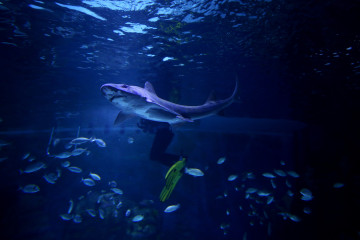

If you were attacked by a lion walking through a jungle, chances are no one would blame the lion. And yet for whatever reason, this rule doesn't seem to apply to shark attacks.
Humans have decided to ignore the fact that the water belongs to the sharks, much like the jungle belongs to the lions. We try to find reasons for the rising number of attacks, while the simple answer stares us in the face: they live there and we, as humans, are intruders to their habitats.
Statistics note that there are, on average, between nine to eleven shark attack fatalities per year. To put that into context, 120 die falling off their bed while asleep. Cows kill more people than sharks do.
"In an economic valuation conducted in Marsa Alam, Egypt in 2010, it was found that a single shark in Marsa Alam could generate $40,000 of income to the diving and Safari boat industry"
People often rush to my fellow marine biologists to ask for explanations when such a tragedy happens, or to study the area in which the fatality occurred. The simplest answer is that sharks are top predators, they attack other animals for food – that is their nature. On the other hand, a 'vegetarian' shark would certainly require a scientific explanation.
So, to understand myths associated with shark attacks, we need to better understand shark feeding behaviour and strategies.
All animals try to maximise net energy from food, the total amount gained from feeding minus the amount of energy spent to obtain the food. The logic, therefore, applies in another way: all animals try to minimise the energy they spend to obtain food, i.e. we're all lazy. This perhaps is the reason why sharks are attracted to the smell of blood, it would indicate wounded or recently dead animals and thus easy prey.
Sharks not only feed on wounded animals, but they also chase bigger prey as any top predator does. The latter tend to be selective in their diet, only feeding on things they are used to. But if their natural food is not available, they are left to explore other options. The question is therefore why is their natural food not available? The answer is human impact.
The number of shark attack incidents in the Red Sea and other locations could be related to human activities, with the following four factors at play:
Firstly, overfishing, i.e. fishing more than we need.
'Overfishing' covers a wide range of human fishing activities including by-catch, illegal fishing, fishing of threatened species, fishing in protected areas and fishing using destructive fishing techniques. All of these lead to a reduction in the number of fish in the water, reducing the number of fish available for sharks.
Secondly, feeding sharks.
Shark diving is a billion-dollar industry around the world. South Africa became the first major destination, with other destinations following around the world. In an economic valuation conducted in Marsa Alam, Egypt in 2010, it was found that a single shark in Marsa Alam could generate $40,000 of income for the diving and Safari boat industry.
While this creates jobs and increases incomes, it breeds irresponsible practice. Safari boats would start to feed sharks to attract them to particular locations, providing them liver and chicken cocktails on an almost daily basis.
Divers are happy to see the sharks and the boat crew is generously tipped for their efforts. As mentioned, sharks try to minimise their feeding effort, and naturally appreciate being fed. The problem begins where the only cocktail left in the sea is humans.
Thirdly, pollution and boat grounding.
Nutrient discharge into seawater through ships or coastal development changes the species composition of shallow waters.
The Red Sea environment is very rich in biodiversity but poor in nutrient content, any increase in nutrients would not only disturb but move the entire food chain into shallow waters.
Increased nutrients would increase phytoplankton concentrations, which would lead to an increase in zooplankton. Therefore, a phenomenon that would normally occur in deep waters is now occurring in shallow waters, attracting predators into areas their not supposed to be.
In Sharm El Sheikh in 2010, it was reported that boats transporting cattle would ditch the dead ones into the waters during their journey.
A couple of dead sheep wouldn't be an environmental catastrophe, however, hundreds are. Animals' dead bodies won't sink, drifting with the current to shallower waters. Sharks follow the easy meal anywhere, and they won't be able to distinguish dead sheep from live swimmers.
Finally, climate change.
A few years ago, if you told someone that the temperature in London is 40°C, they would have called you crazy. Climate change is affecting everything in our oceans, including coral bleaching and change in fish assemblage.
Records of fish species are moving to cooler waters and fish spawning aggregations. This means that fish are migrating from original locations to new ones, searching for a more sustainable environment to search for food.
The whole food chain moves, including sharks. Climate change could also affect marine animals in ways we have yet to understand: a change in behaviour, searching for new food items, increased aggression and more.
Shark attacks have a hugely negative impact on the economies of countries that depend on coastal tourism.
Decisions have since been made to call for the fishing of sharks (which is more environmental, by the way) or to find the particular shark that caused the attack. The question remains: are shark attacks a problem that needs a solution? Or natural behaviour that needs to be studied more.
Dr Mohamed Ismail is an Associate Professor of Marine Ecology and Molecular Biology at Suez Canal University, Egypt
![Silky shark and scuba diver in the Red Sea, Egypt [Getty Images]](/sites/default/files/styles/medium_16_9/public/2022-08/GettyImages-549028899_0.jpg?h=21017897&itok=PM_GQM1s)




 Follow the Middle East's top stories in English at The New Arab on Google News
Follow the Middle East's top stories in English at The New Arab on Google News


